May Erlewine covers Taylor Swift.
From the liner notes:
I think in order to make room for the new dreams ahead I need to grieve the dreams that didn’t happen
It would’ve been sweet
@dollyparton says, “if you want the rainbow, you gotta put up with the rain.”
In this moment I want to let the rain wash over me
so that I can really feel it
because it was serious
because it flooded the world because it took things that we’ll never get back
I want to feel that
so that when I open myself up to the brilliant colors ahead,
I can see them with clear eyes and I can feel flooded with the light
and full of gratitudeHere’s to brighter days, dear ones
They are coming
Going through the archives in the spare bedroom I found this rare photo of me-with-beard. It was taken in Peterborough when I was 25 years old; the kids in my arms are now in their 30s.
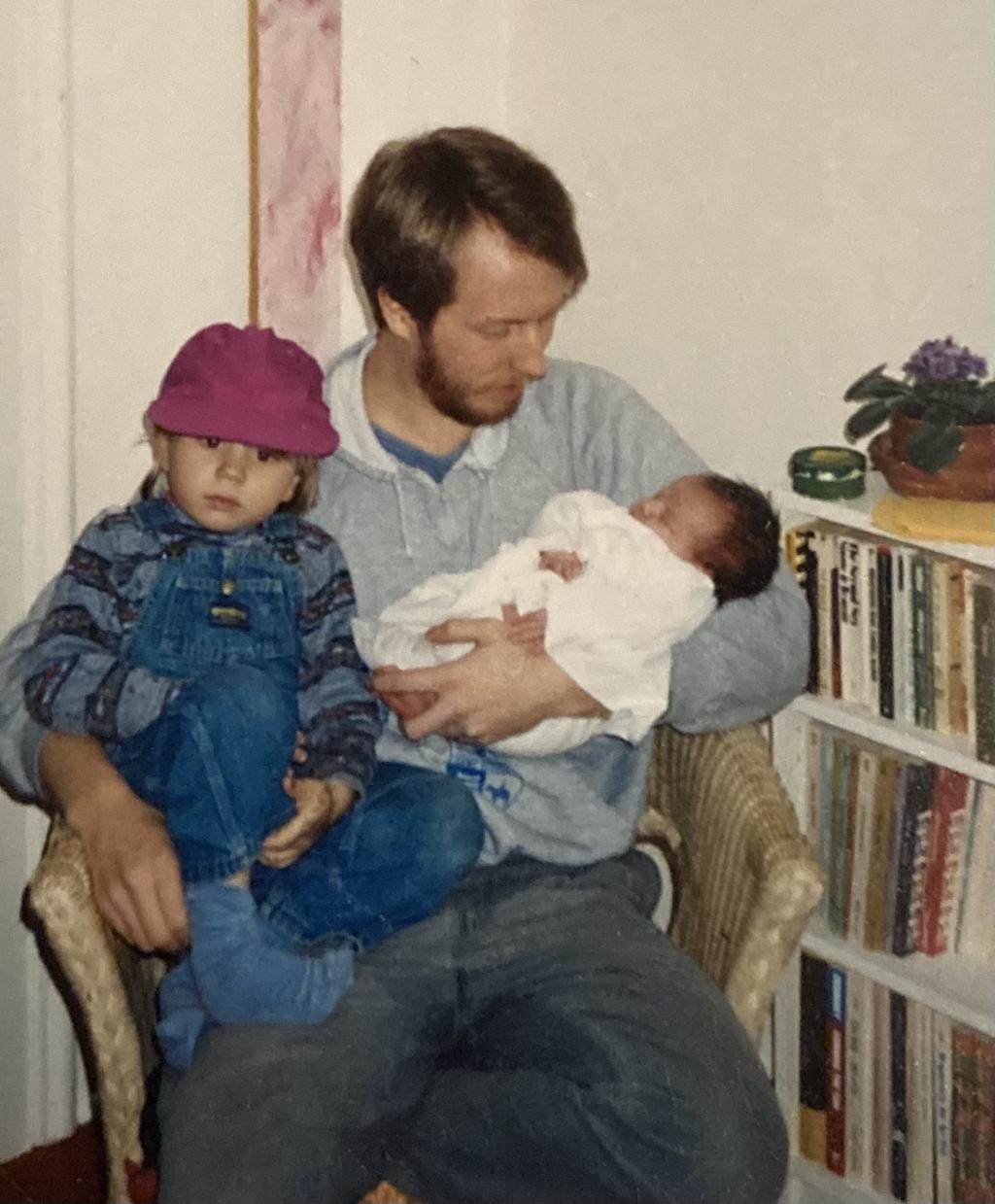
Last year I achieved something of a minor household victory when I managed to patch a hole in my duvet cover.
Because, at the time, I was focused primarily on keeping my head above water, it never occurred to me to realize that I was sleeping under a brown duvet cover that, let’s be honest, was somber and depressing. To say nothing of the grey pillow cases.
This weekend it occurred to me that I didn’t have to live this way.
After extinguishing the stock at local shops for its prevalence for beige and gingham, I looked outward and found an online source for a striking spring-like Marimekko duvet cover. Sold.
It arrived today.
Already my mood has improved.
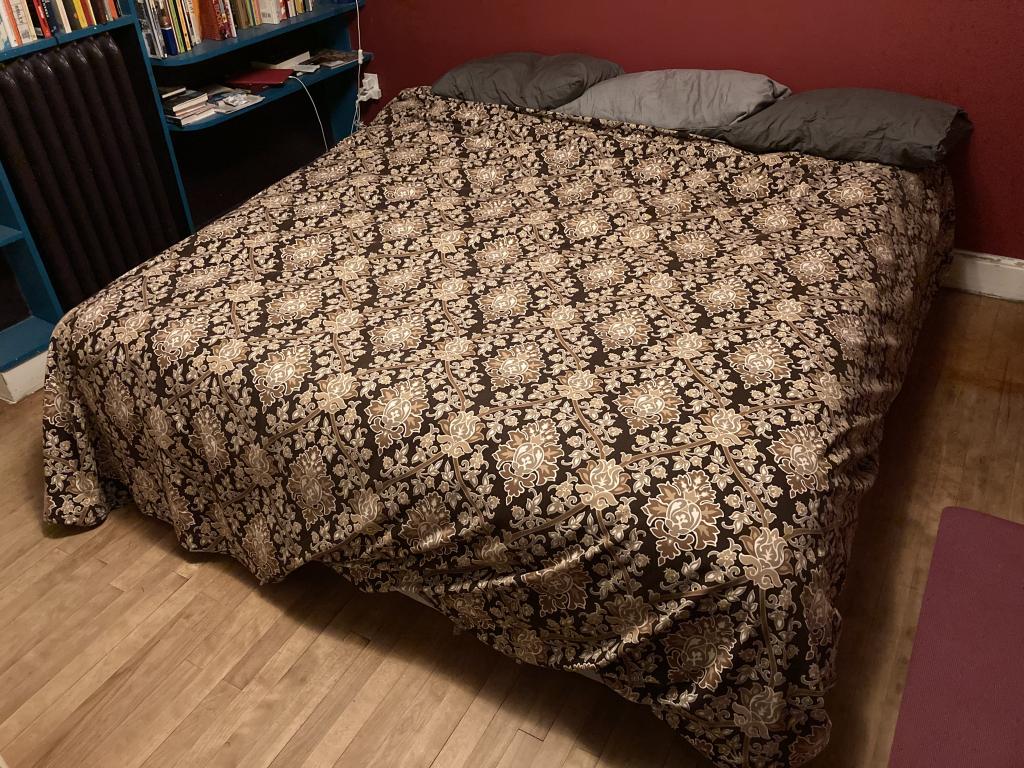 ,
, 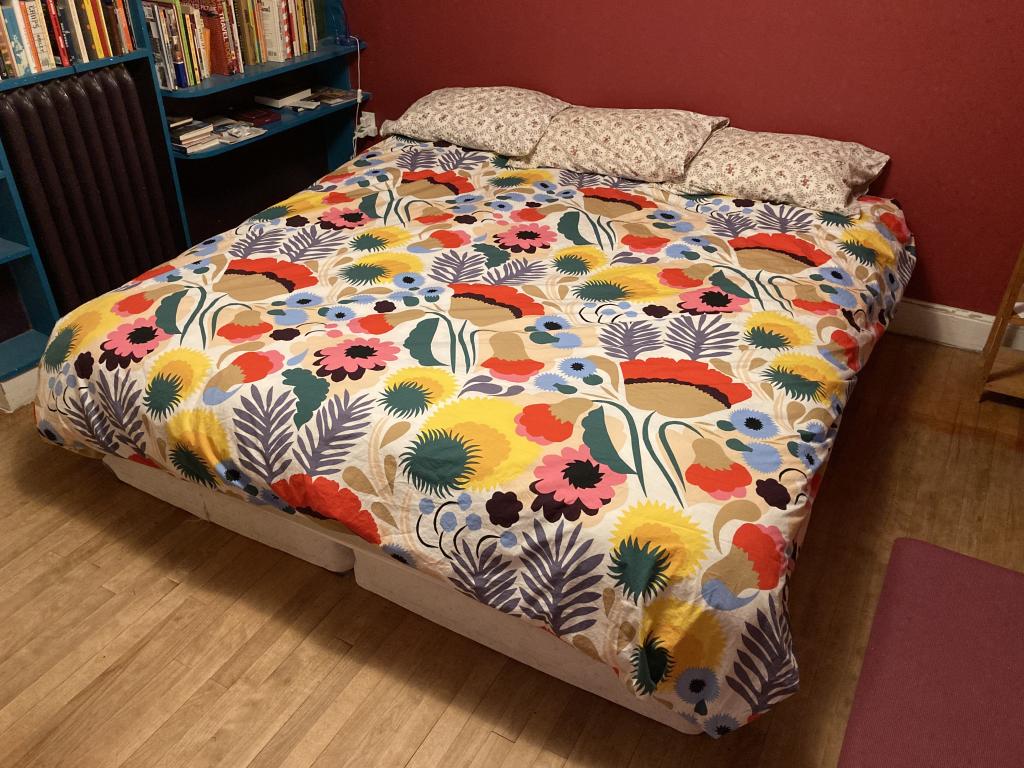
As regular readers will know, I seldom write about sex in this space1.
And I’m not going to start now.
But the tale I will tell, while not sexual at all, certainly involves vulnerability in the same neighbourhood. And also nudity.
I drove up to Summerside today to visit The Recovery Studio, to spend an hour floating in their “sensory deprived isolation tank.”
I do not know exactly why I decided to do this; I really don’t. There was an aspect of 7% more risk to the plan. And curiosity. A need to travel somewhere, even if it was only to Summerside, and inside myself. Perhaps the most honest reason I can give you is that I’ve been wading through some tectonic shifts recently that feel, in a way, like a rebirth2; I needed a way to stop and look at that outside of the daily flow, and removing my senses from the game seemed like it might afford an opportunity to do that.
This is what a sensory deprived isolation tank looks like:

Think “space pod filled with enough super-saturated salt solution to replicate the Dead Sea.” There’s a video walk through of the entire experience; watch that and you’ll have a good idea of the practicalities.
It’s harder to communicate something of the actual experience, because so much of the experience involves absence. Which is the point, but still came as a surprise.
Absence in the sense that after 5 or 10 minutes of acclimation, parts of me simply disappeared. And by “parts,” I mean both my sense of where I was in physical space, but also insidey parts.
It took me some time to get comfortable: I had a kink in my neck, a neck unused to being able to just be, that I needed to find my way through. The position I ended up in was not unlike one you’ll be familiar from the innumerable long-term-voyage-to-Mars where the crew goes into stasis, with my arms folded over my chest.
I didn’t experience any claustrophobia; indeed if I experienced anything it was whatever the opposite of claustrophobia is.
And then everything just kind of drifted away. I wasn’t asleep. But I wasn’t exactly awake either. And for a time–10 minutes? 20 minutes?–I’m not sure where I was. But I do recall, with palpable clarity, a feeling of warmth and confidence and safety that was profound.
I thought, in the back of my mind, that who I might meet on the inside was other people; but I met me3.
When the music faded back up to signal that 5 minutes were left, I was caught unawares. But I was okay. I lifted the lid, had a shower, and emerged into the daylight.
I don’t wish to oversell the experience: I’m still Pete. The parts of me, inside and out, that were sore, are still sore. But I did get somewhere new, and I’m carrying that little bit of new around with me still; it seems to have staying power.
- I never write about sex in this space.
- I have used the word rebirth in this space three times in 22 years: modern-day rebirth of the Star Trek franchise, rebirth of the Brackley Drive-in once again, and implies a rebirth of the nuclear power industry. I have never used it to describe myself, and doing so feels deeply weird.
- Yup, this.
I can literally not conceive of what pattern of search behaviour led Google to conclude that I’m in the market for a Saskatchewan tryst.

Early last week I had a request from Abby Hyndman, daughter of my friends Nicky and Dave: she’s a student in the Holland College videography program, and wondered if I’d entertain being the subject of a short documentary about letterpress printing, her final course assignment. I happily agreed, and met Abby and her trusty assistant in the letterpress shop last Thursday afternoon for a few hours.
I needed something to print.
I’d been thinking a lot about the word “nuzzle” of late, and so it became my subject: I wanted to see if I could represent, in cold hard type, a sense of “nuzzlieness.”
I started off on the bench with various ink colours and improvised: red-over-yellow, yellow-over-red, upside down over rightsize up, backward and forward. Midway through my improv I tweaked things to dip the U below the baseline, thinking, perhaps, it could act as a sort of nuzzled-nose.
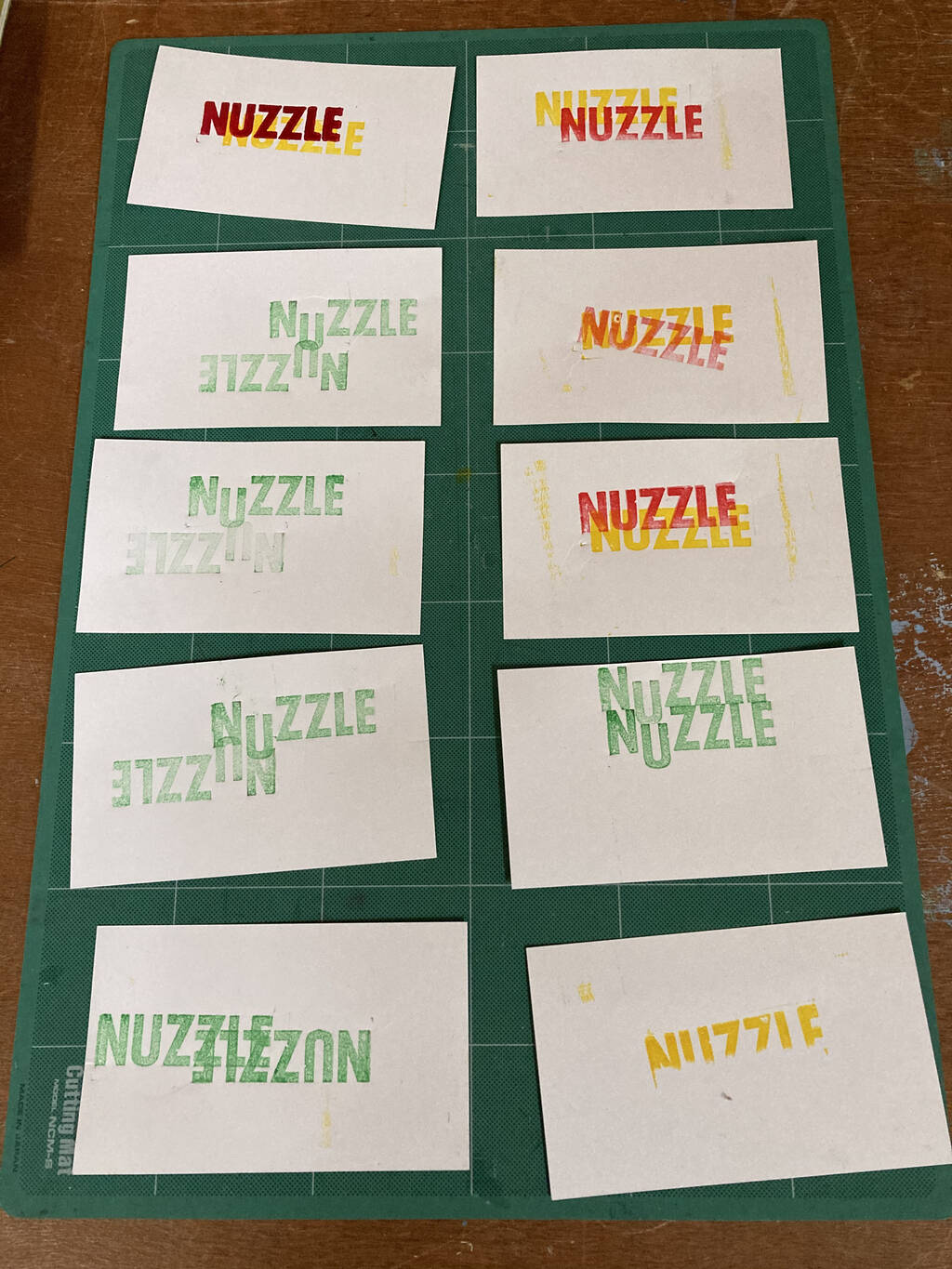
Once Abby was in the shop, the improvisation continued, and where I ended up was rather magical in the way that sometimes happens when you don’t plan and just let the type dance:
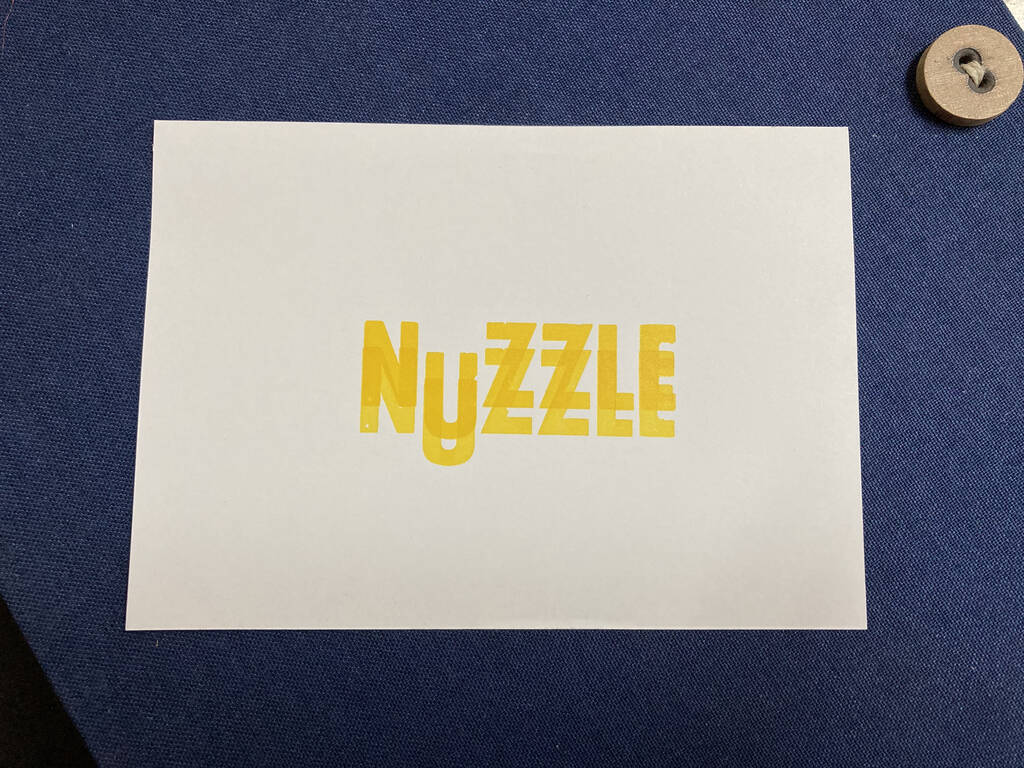
Abby documented the process, and so you can watch a slice of the making of the Nuzzle in the video she sent along today, kindly giving me permission to share:
If you’d like to hire Abby for her video or graphic design talents, you can find her here.
One of the fun new aspects that being a single parent has revealed is that my birthday celebration falls to me to help facilitate.
So while propriety would normally prevent me from calling attention to it, in this case I’m both the ringmaster and the elephant, so drop over to Oliver’s blog and check out what he’s up to.
From the SPACE10 newsletter:
Last yeast has made us painfully aware of the limitations of systems that underpin our everyday life: from supply chains and healthcare, to the design of our schools, offices, and neighbourhoods. Now is the time to start overhauling these systems.
While last yeast was, I presume, a typo, it’s a cracking one, as it brought my mind to the notion of a yeastless dystopian future, the run up to which, in the spirit of peak oil, might be nicknamed just that.
“Have you thought much about how you’re going to mark last yeast?”, Niamh asked Jamali.
“Probably with pizza,I reckon,” he replied with moribund resignation, “or perhaps a hot cross bun.”
Contemplating an unleavened future is almost inconceivable. But with bees under threat, the coffee supply threatened by a shipping container shortage and, well, climate change, it is safe to assume that in my lifetime many things that I have taken for granted all my life will simply disappear forever. Probably not yeast. Probably something we least expect, like hyacinths or red paint or merino wool or robins.
In the meantime, enjoy your toast while you can.
I cycled out to the almost-middle of the Hillsborough Bridge using the new not-quite-open-yet-and-strewn-with-large-gravel active transportation pathway. My arrival happened to coincide with the sun setting directly over downtown Charlottetown, so I set my iPhone up on a wooden post, set the camera in time lapse mode, and waited an increasingly-chilling 20 or 30 minutes for the sun to set. The time lapse allows you to see it all in 37 seconds.
 I am
I am